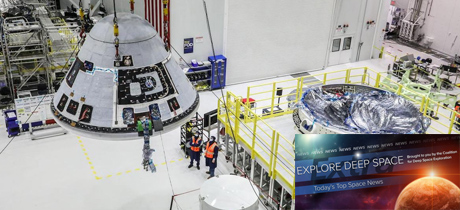In Today’s Deep Space Extra… Boeing completes software requalification for its Starliner crew capsule ahead of second flight test. The current White House released yet two more space policy-related documents.
Human Space Exploration
Boeing making progress on Starliner software for test flight in March
Coalition Members in the News – Boeing, United Launch Alliance
Spaceflightnow.com (1/18): Boeing has completed a requalification of the CST-100 Starliner’s flight software ahead of its next flight. The autonomous spacecraft will fly to the International Space Station (ISS) during a second uncrewed flight test, Orbital Flight Test-2 (OFT-2), targeted for March. The OFT-2 mission will lay the groundwork for the next Starliner test flight to carry NASA astronauts to the ISS later this year, followed by the start of regular crew rotation flights.
Space Science
‘Sun Science’ stamps will feature NASA solar observatory images
CollectSpace.com (1/15): The United States Postal Service (USPS) on Friday announced “Sun Science”, a set of ten different stamps that will celebrate the ongoing study of the Sun using digital images from NASA’s Solar Dynamics Observatory (SDO). The images on the stamps display common events on the Sun, such as solar flares, sunspots, and coronal loops.
China’s retrieved lunar samples weigh less than targeted
Reuters (1/18): China’s recent Chang’e-5 lunar sample return mission planned to collect 4.4 pounds of material from the Moon. The actual return was 3.8 pounds, according to a mission spokesperson on Monday. China remains open in working with other countries to study the sample material.
Opinion
Comparing the 2010 and 2020 National Space Policies
The Space Review (1/18): On December 9, the Trump White House issued a National Space Policy to replace the one issued by the Obama White House in 2010. An analysis of the two reveals that the 2020 policy builds upon and expands many of the 2010 policy’s objectives, demonstrating that the exploration and utilization of space is nonpartisan, explain Laura Brady, secretary of the University of Mississippi’s Ole Miss Air and Space Law Society, and Charles Ellsey, National Space Society legal fellow.
Other News
Trump administration still has more to say about space policy property rights and orbital debris
Coalition Member in the News – Boeing
Spacepolicyonline.com (1/18): As it prepares to depart the White House, the Trump administration has issued two space policy-related documents. One is a chapter in the annual report of the Council of Economic Advisers (CEA) advocating for public-private partnerships and property rights in space. The other is a research and development plan for orbital debris from the Office of Science and Technology Policy (OSTP).
Biden announces new science team, elevates office to Cabinet
NBC News (1/16): As their inauguration approaches, President-elect Joe Biden and Vice President-elect Kamala Harris outlined their selection for key science advisers, with a pledge to respect the science discipline and the findings it produces. Eric Lander will serve as the director of the White House Office of Science and Technology Policy (OSTP), which will become a Cabinet level position. Maria Zuber, a planetary scientist, will co-chair the President’s Council of Advisors on Science and Technology Policy with Frances H. Arnold, a female Nobel prize winner in chemistry.

